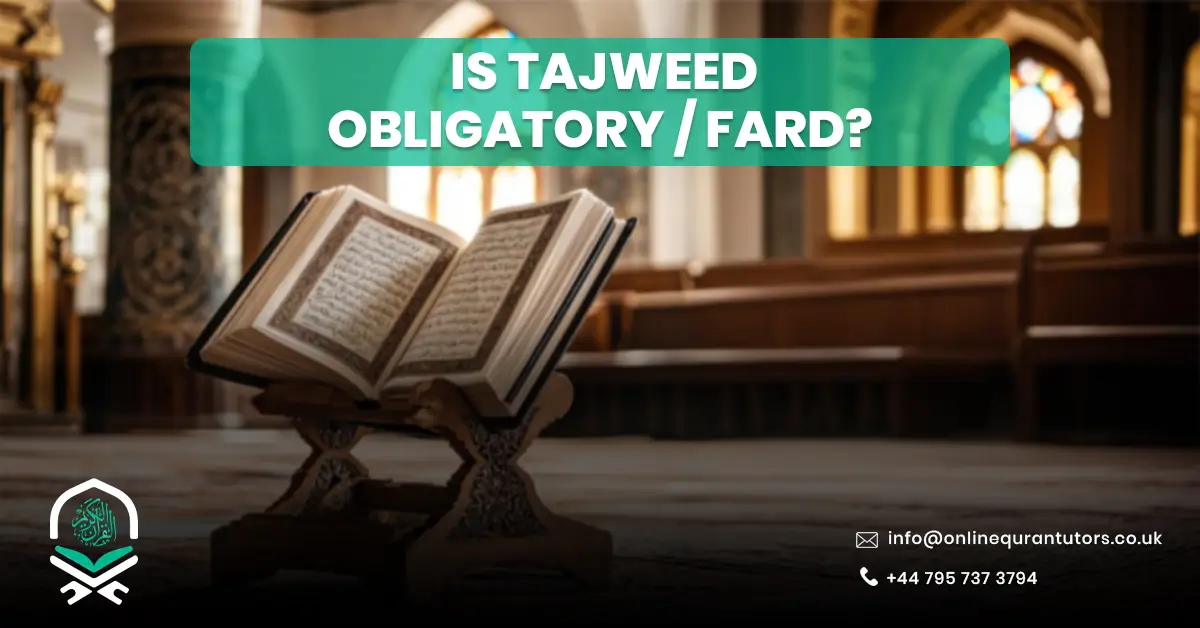Tajweed refers to the correct pronunciation and articulation of the Arabic letters and words in the Quran. It ensures that each letter is recited in its proper form, preserving the intended meaning and sound of the divine text. Given the sacred nature of the Quran, many Muslims wonder whether Tajweed is obligatory for those who recite it, especially during Salah (prayer) or in the process of memorization.
In this article, we will examine whether Tajweed is obligatory in Islam. We will discuss its importance, explore different Islamic perspectives, and investigate whether it is considered a compulsory practice by Islamic scholars. We will also explore if learning Tajweed is necessary for self-study, what the Prophet Muhammad (PBUH) said about it, and whether it is viewed as fard ayn (an individual obligation) for every Muslim.
Furthermore, we will look at practical aspects of reading the Quran with Tajweed, the benefits of proper recitation, and whether the Prophet Muhammad (PBUH) and his companions used Tajweed when reciting the Quran. By the end of this article, you will have a better understanding of whether Tajweed is an obligatory practice in Islam and why it holds such significance in the recitation of the Quran.
Is Tajweed Obligatory / Fard in Islam?
No, Tajweed is not strictly obligatory in Islam. While it is highly recommended for accurate and beautiful recitation, it is not required for the validity of Quranic recitation.
Is Tajweed Fard Ayn?
Fard Ayn refers to individual obligations that every Muslim must fulfill, such as daily prayers and fasting during Ramadan. These duties are personal, and neglecting them is a sin.
Tajweed, however, is classified as Fard Kifaya, a communal obligation. If enough people in a community learn Tajweed, the responsibility is fulfilled for the entire community. If no one learns it, then the entire community is considered to have neglected a duty. However, Tajweed is not Fard Ayn, meaning it is not individually obligatory for every Muslim to master it.
Also Read: What is Qalqalah In Tajweed | Letters, Types, Rules & Examples
Did The Prophet Read The Quran With Tajweed?
Yes, the Prophet Muhammad (peace be upon him) recited the Quran with the utmost precision and beauty, embodying what we now understand as Tajweed. His recitation was flawless, setting the standard for how the Quran should be pronounced. He placed great emphasis on the proper articulation of each letter and word, which became a model for future generations of Muslims.
In the years following the Prophet’s time, scholars who were closely connected to his teachings began to recognize the importance of preserving the integrity of the Quranic recitation. They carefully studied his manner of reading and developed the detailed rules of Tajweed to ensure that the Quran’s pronunciation would be maintained accurately across centuries. This effort has been instrumental in safeguarding the purity of the Quranic recitation as it was revealed.

Did The Companions Read The Quran With Tajweed?
Yes, the companions of Prophet Muhammad (may Allah be pleased with them all) are widely regarded as having recited the Quran with Tajweed. As the direct students of the Prophet (peace be upon him), they were the foremost authorities on the correct pronunciation and recitation of the Quran. They learned from him personally, and their recitations followed the same precise and beautiful style that the Prophet had demonstrated.
The companions’ commitment to preserving the Quran’s correct recitation played a crucial role in the transmission of Tajweed rules. Their practice and understanding of the proper articulation of each letter and sound formed the basis for the Tajweed guidelines we follow today, ensuring that the Quran is recited with accuracy and beauty across generations.
Why Choose a Tajweed Course from an Online Quran Tutor?
Learning Tajweed is key to mastering Quranic recitation, and choosing an online Quran tutor in the UK offers several advantages. When you learn Tajweed Quran, you receive personalized lessons that cater to your level of proficiency, whether you’re a beginner or aiming to refine your skills.
With online learning, you have the flexibility to schedule lessons according to your convenience, all from the comfort of your home. Experienced tutors in the UK guide you through the proper pronunciation and articulation of Arabic letters, ensuring accurate recitation.
The interactive nature of online classes allows real-time feedback, helping you understand Tajweed rules more effectively. Enrolling in a Tajweed course from an online Quran tutor ensures you get the best quality education while learning at your own pace. Learn Tajweed Quran online and strengthen your connection to the sacred text.
Join Online Quran Tutor UK – Start Your Free Trial Today!
At Online Quran Tutor UK, we’ve designed our Quran with Tajweed Online Course to make learning Tajweed and Quranic rules easier and more effective for online learners of all ages. Our experienced teachers simplify complex Tajweed rules through engaging examples, interactive activities, and easy-to-follow video lessons.
Whether you’re just starting or looking to improve your recitation, we’re here to support you every step of the way.
Courses We Offer:
- Noorani Qaida Course – Learn the fundamentals of Arabic and Quranic pronunciation.
- Online Tajweed Course for Kids – Specially designed for children to learn Tajweed in a fun and interactive way.
- Quran Reading Course – Build fluency and confidence in reading the Quran correctly.
We also offer:
Contact us now to book your free trial class and begin your spiritual journey with expert guidance and flexible learning options!
Conclusion
While Tajweed is not an individual obligation (Fard Ayn) in Islam, it is highly recommended for accurate Quranic recitation. It ensures the correct pronunciation of each letter, preserving the Quran’s intended meaning. Tajweed is considered a communal obligation (Fard Kifaya), meaning that if enough people learn it, the duty is fulfilled for the community.
The Prophet Muhammad (peace be upon him) and his companions set the standard for flawless recitation, and their example laid the foundation for the Tajweed rules we follow today. While not mandatory for every Muslim, learning Tajweed enhances the beauty and spiritual connection to the Quran.





